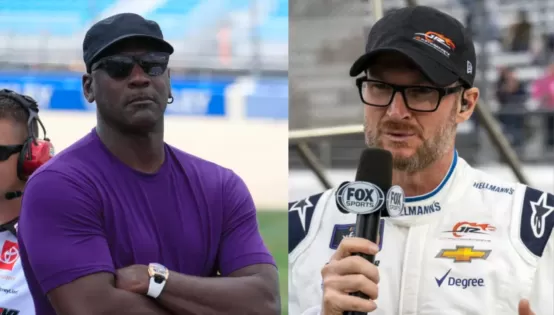Two teams have been standing apart this season, not because of their performance on the racetrack, but because of a disagreement with NASCAR’s new charter agreement. While most teams have eagerly signed the agreement, ensuring guaranteed race spots and steady payouts, Front Row Racing and 23XI Racing have chosen to take a different path.
The two teams have filed a lawsuit against NASCAR, citing antitrust grounds as the main reason for their action. This move has caught the attention of fans and industry insiders, as it is not often that teams go against the governing body of the sport.
NASCAR’s charter agreement, introduced in 2016, is aimed at ensuring long-term stability for teams and owners. It guarantees 36 charter teams a spot in every race, which means they do not have to qualify on speed. This has been seen as a huge advantage for teams, as it provides them with more consistent revenue. However, for smaller teams like Front Row Racing and 23XI Racing, the charter agreement has not been beneficial.
Front Row Racing, a two-car team owned by Bob Jenkins, has been in the NASCAR Cup Series since 2005. Their decision to file the lawsuit stems from their frustration with the current state of the sport. As a smaller, less-funded team, they feel that the charter agreement has further widened the gap between themselves and the top teams. Without the possibility of qualifying on speed, they are left with limited opportunities to prove themselves on the track and attract sponsorship.
23XI Racing, co-owned by NBA legend Michael Jordan and NASCAR driver Denny Hamlin, was formed just last year and is set to make its debut in the Cup Series this season. They have been vocal about their displeasure with the charter agreement, stating that it is unfair for new teams to have to buy their way into the sport. As a team with high-profile owners and a promising driver in Bubba Wallace, they believe they should have the same opportunities as other teams.
The lawsuit filed by the two teams raises an important question – is the charter agreement really the best solution for the sport? While it may provide stability for the top teams, it seems to have left smaller and newer teams struggling to compete. This goes against NASCAR’s goal of promoting fair and competitive racing.
In the midst of this controversy, former NASCAR driver and current NBC Sports analyst Dale Earnhardt Jr. has raised a red flag. He believes that the charter agreement is ultimately hurting the sport and needs to be reevaluated. In a recent episode of his podcast, he stated, “I think it (charter agreement) is really limiting the growth of our sport and the opportunities for new car owners to come in. I think it’s a problem.”
Earnhardt Jr.’s opinion carries weight as he comes from an iconic racing family and has firsthand experience with the struggles of smaller teams in the sport. His comments have sparked further discussions in the racing community and shed light on the potentially harmful impact of the charter agreement.
On top of their disagreement with the charter agreement, Front Row Racing and 23XI Racing have also expressed disappointment over the unequal perks provided to different teams by NASCAR. In a recent report by The Athletic, it was revealed that the two teams were not offered the same luxury perks as the other charter teams, such as private charter flights and suite access at races. While this may seem like a minor issue, it adds to the feeling of inequality between teams.
It is understandable why Front Row Racing and 23XI Racing have taken a stand and questioned the current state of the sport. As the lawsuit continues, it will be interesting to see how NASCAR responds and if any changes will be made to the charter agreement.
Despite the controversy surrounding their actions, Front Row Racing and 23XI Racing have shown courage in going against the norm and standing up for what they believe is right for their teams and the sport. This move has brought attention to the flaws in the current system and sparked important discussions about the future of NASCAR.
As NASCAR fans, we can only hope that a resolution can be reached that benefits all teams and promotes fair and competitive racing. In the words of Dale Earnhardt Jr., “We need to have a healthier and fairer system for these guys to be able to compete week in and week out and get a return on their investment.” Let’s hope that the voices of team owners like Bob Jenkins and Michael Jordan are heard and necessary changes are made for the betterment of the sport

